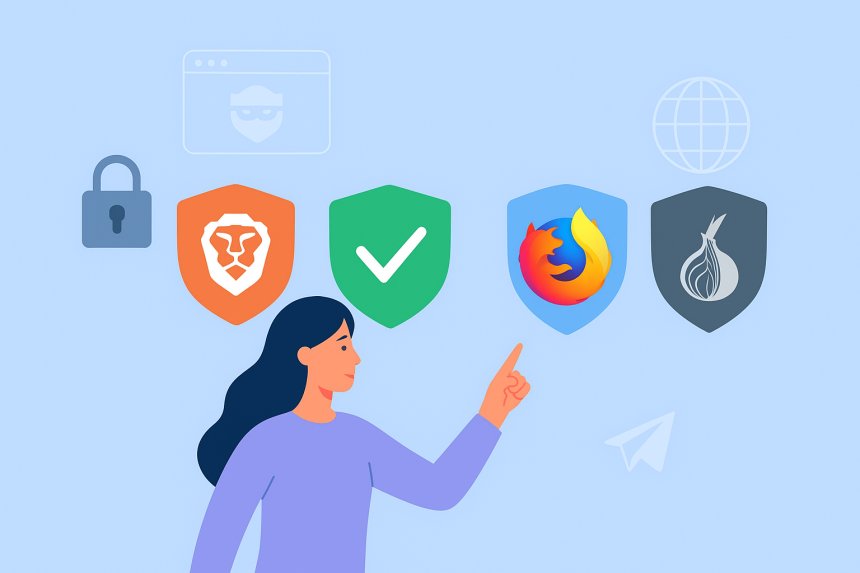
When people think about online privacy, they often focus on VPNs, passwords, or antivirus tools. But one of the biggest privacy decisions you make every day is simple:
👉 Which browser do you use?
Your browser is the gateway to the internet — and also the #1 tool companies use to track:
Some browsers protect you.
Others profit from your data.
This article breaks down the best privacy-focused browsers in 2025, how they protect you, and which one is right for your needs.
Every website you visit loads scripts, cookies, and tracking pixels. Over time, these form a detailed profile of:
Your interests
Your routines
Your spending habits
Your personality
Your online identity
Mainstream browsers like Chrome and Edge collect data for "improvement" — but much of it feeds advertising networks. Even Safari, while better, still has tracking risks.
To take control of your digital life, you need a browser designed for privacy from the ground up.
Best for: Everyday users who want strong privacy without complexity.
Brave blocks:
✔ Trackers
✔ Third-party cookies
✔ Fingerprinting scripts
✔ Ads
✔ Hidden trackers in videos
✔ Cross-site data storage
It also features:
Built-in VPN (paid)
Built-in Tor window mode
HTTPS upgrade
Fast, clean browsing
Why it’s great:
You get Chrome’s speed without Google’s tracking.
Best for: Users who want control over every privacy setting.
Firefox is open-source and offers powerful privacy controls:
Enhanced Tracking Protection
Cookie isolation
Anti-fingerprinting
Facebook Container (blocks Facebook tracking)
DNS over HTTPS
Optional VPN
Zero telemetry modes
With add-ons like uBlock Origin, Privacy Badger, or NoScript, Firefox becomes nearly tracker-proof.
Best for: High-risk users, journalists, activists, or anyone needing true anonymity.
Tor routes your traffic through a global network of relays, making it almost impossible to trace your:
IP address
Location
Online activity
It also prevents browser fingerprinting.
Downside:
Slower speeds due to multi-layer encryption.
Use case:
When your identity truly must stay hidden.
Best for: Phone users who want simple, no-nonsense privacy.
Features include:
Tracker blocking
Forced HTTPS connections
Private search engine
Email tracker removal
Fire button (one-tap data wipe)
No browsing history stored
A desktop version is also becoming more popular as a lightweight privacy-first option.
LibreWolf is a hardened, privacy-enhanced fork of Firefox. It removes:
Telemetry
Sponsored links
Data reporting
Auto-connections
It includes stricter:
Anti-fingerprinting
Tracking protection
Security patches
Downside:
Not ideal for beginners.
For people who love the Chrome experience but hate Google tracking, Ungoogled Chromium removes:
Google services
Data reporting
Sync connections
Built-in ad trackers
You get Chrome’s compatibility and speed — without Chrome’s privacy risks.
🚫 Google Chrome – one of the biggest data collectors in the world
🚫 Microsoft Edge – aggressive telemetry and user profiling
🚫 Opera – owned by a China-based consortium with unclear data policies
🚫 UC Browser – repeatedly exposed for leaking sensitive user data
These browsers prioritize profits and ads over privacy.
Even the best browser needs proper settings. Here’s how to maximize protection:
uBlock Origin
Privacy Badger
HTTPS Everywhere
NoScript

Brave or Firefox
Tor Browser
DuckDuckGo Browser
LibreWolf or Ungoogled Chromium
Choosing the right browser is one of the simplest ways to reduce your digital footprint and protect your identity online.
You can’t control everything websites collect — but you can control the browser you use every day.
A privacy browser gives you:
Privacy isn’t automatic anymore.
With the right tools, you can take it back.
 Like
0
Like
0
 Dislike
0
Dislike
0
 Love
0
Love
0
 Funny
0
Funny
0
 Angry
0
Angry
0
 Sad
0
Sad
0
 Wow
0
Wow
0